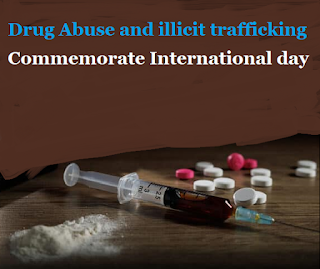Drugabuse-alk.blogspot.com -- Drug abuse is a serious issue that affects millions of people worldwide. The abuse of drugs not only harms the individual but also has a ripple effect on their family and society at large. It can lead to addiction, health problems, financial difficulties, and even death. Therefore, it is essential to take proactive measures to prevent drug abuse, While there is no one way or guaranteed way to prevent someone from abusing drugs, there are things that everyone can do to prevent substance abuse.
In this article post, we will discuss the top 10 ways to prevent drug abuse :
1. Education and Awareness
Peoples should be informed about the dangers of drug abuse and the consequences that come with it. This education should start at a young age and continue through adulthood. To parents, teachers, and community leaders can play a significant role in educating people about the risks of drug abuse.
2. Encourage Healthy Activities
Peoples who are engaged in sports, music, art, and other extracurricular activities are less likely to abuse drugs. These activities provide a sense of purpose, boost self-esteem, and offer an opportunity to form positive relationships.
3. Build Positive Relationships
Strong relationships with family, friends, and peers can act as a protective factor against drug abuse. Individuals who have supportive relationships are less likely to turn to drugs to cope with stress, depression, or anxiety. Remmember encourage your loved ones to build positive relationships and be a positive role model yourself.
4. Monitor Prescription Drugs
Prescription drug abuse is becoming increasingly common. Therefore, it is important to monitor the use of prescription drugs. Healthcare providers should be vigilant when prescribing medications, and patients should follow the prescribed dosage. Unused medication should be properly disposed of to prevent misuse.
5. Avoid Peer Pressure
Peer pressure is a common reason why people start using drugs. It is essential to teach individuals how to say no to drugs and avoid situations where drugs are present. Friends and family members can support each other in making healthy decisions.
6. Set Clear Boundaries
Parents, teachers, and community leaders should set clear boundaries for drug use. This can include rules about drug use at home, at school, or in the community. Setting clear boundaries helps individuals understand the consequences of drug use and encourages them to make healthy decisions.
7. Seek Help
Individuals who are struggling with drug abuse should seek help. This can include talking to a trusted friend or family member, seeking counseling, or enrolling in a treatment program. It is important to remove the stigma around seeking help and encourage individuals to seek support when needed.
8. Provide Positive Reinforcement
Positive reinforcement is an effective way to prevent drug abuse. Individuals who receive praise and recognition for their achievements are less likely to turn to drugs. Encourage positive behaviors and celebrate successes to reinforce healthy choices.
9. Foster a Sense of Community
Creating a sense of community can help prevent drug abuse. When individuals feel connected to their community, they are less likely to engage in risky behaviors. Encourage community engagement through volunteer work, community events, or other activities.
10. Develop Skills and dreams for your future
Finally, Develop Skills and dreams for your future can help prevent drug abuse. These will help you focus on what you want and help you realize that drugs and alcohol will simply get in the way and hinder you from achieving your goals. Individuals who have healthy mechanisms are better equipped to deal with stress, anxiety, and depression.
Share these tips for avoiding and preventing substance abuse with public, your friends and family, It is educating individuals about the dangers of drug abuse, encouraging healthy behaviors, building positive relationships, monitoring prescription drugs, avoiding peer pressure, setting clear boundaries, seeking help, providing positive reinforcement, fostering a sense of community, and Develop Skills and dreams for your future. By implementing these strategies, we can create a safer, healthier, and drug-free society. Amien






